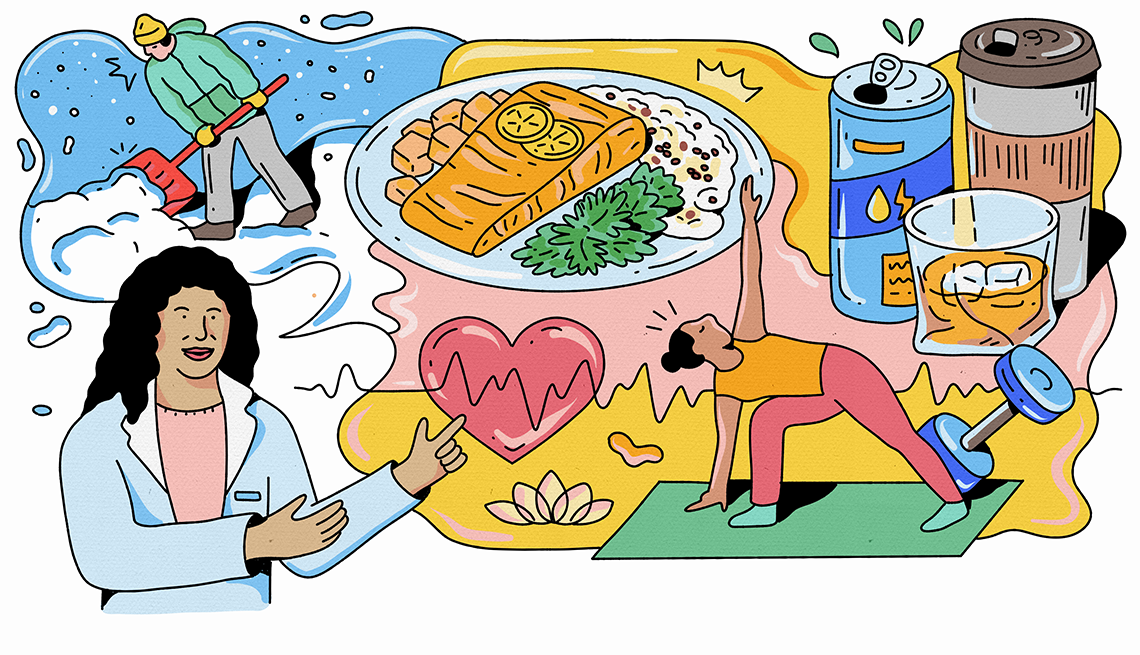AARP Hearing Center


February is American Heart Month, the perfect time to take a closer look at your heart health. Let’s start with the bad news: Yes, your risk of developing heart disease increases with age. After 50, your blood vessels start stiffening, your heart wall gets thicker and inflammation sets in, setting you up for a possible cardiovascular event.
But we’re not telling you this to send you into a spiral of despair. Heart disease is serious and scary — but not unavoidable. There have been some remarkable new therapies and technologies for treating heart disease introduced in recent years, and we know more than ever about the importance of diet and exercise. But if you really want to outsmart heart disease, you’ve got to be one step ahead of it. That means getting insider tips from a person whose entire job is to ensure our hearts keep working as long as possible.
Martha Gulati, MD, the Director of Preventive Cardiology at Cedars‑Sinai's Smidt Heart Institute, and the author of Saving Women’s Hearts shares 14 steps everyone over 50 can take for a stronger, healthier, more resilient heart.
Don’t treat your cardiologist like a traffic cop
Patients think they know what we doctors want to hear. If I ask them about the negative things, like how much alcohol they drink or whether they smoke, they always underestimate it. And they overestimate how much exercise they’re doing. But cardiologists and patients need to work together like partners, not adversaries. You shouldn’t talk to us like you’re trying to talk your way out of a speeding ticket. We’re on your side. We’re your partner in this journey. And we can only help if we really know what’s going on. You should think of your doctor’s office as a safe space. And if for any reason you don't feel that way, then find a new doctor.
Keep track of any chest discomfort or shortness of breath
I see both men and women downplaying their symptoms as if they almost don’t want to bother their doctor with them. They’ll say, “I get this chest discomfort, but it’s probably nothing.” And they minimize it. But actually, we really need to hear about those symptoms honestly. We want to hear exactly what you’re feeling. We need to know the real facts of when and how those symptoms appear. Then, we’ll go through it with you and determine whether it’s related to your heart. In addition to chest discomfort, you should always talk with your provider if you experience shortness of breath while doing an activity you formerly could do without any problem.
Find a reason to laugh every day
A few studies of older adults have demonstrated how laughter can be an effective way to keep your heart healthy. Specifically, these studies looked at the artery function and found a benefit from a coronary artery standpoint. We’re not sure exactly what’s happening, but we know that endorphins get released when you laugh, which can actually latch onto receptors in the blood vessels, which may be one of the reasons why we see benefits in the artery function. Once they attach, the arteries themselves may be better able to release nitric oxide, which relaxes the arteries and improves blood flow.
Have more (worry-free) sex!
There’s that old Hollywood cliche where an older man sleeps with a younger woman and has a heart attack. Somehow that’s evolved into anxiety that all older adults having sex could end up with heart failure. Sex does increase our heart rate and blood pressure, but don’t overestimate it as a physical activity. You probably exert more energy with a brisk walk. (Of course, if you’re doing something really athletic and interesting, that might be a different story!) But regular intercourse is fine. If you start having chest pain during sex, or you’re feeling a shortness of breath, that’s something you should talk to your doctor about. But otherwise, sex has been found to reduce the risk of heart disease, not encourage it.
You don’t need to drink alcohol to reduce stress — you need a dog
For years now, we’ve been telling people that there’s no real amount of alcohol that we recommend, from a heart health perspective. If you don’t drink, don’t start. If you do drink, then drink moderately. The recommendation for men is two or fewer drinks per day. For women, it’s one glass of wine or the equivalent daily.
But an even better recommendation is not to drink at all, and find a healthier way to deal with your stress. So consider getting a dog. There’s some evidence that owning a dog can reduce your risk of heart disease and stroke by over 30 percent. Dogs can reduce stress, anxiety and depression. And nobody has ever gotten a hangover from living with a dog.






































































You Might Also Like
Should You Take a Daily Aspirin?
A cardiologists' advice about who should regularly take this common medication
19 Heart-Smart Choices to Make Throughout Your Day
Treat your heart right morning, noon and night with these easy, research-proven, expert-endorsed ideas
My Heartbeat Feels Off
A cardiologist explains whether you need to worry when you feel your heart is sometimes off kilter